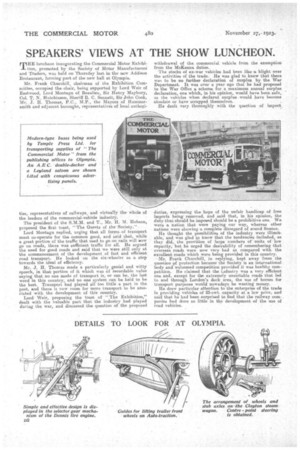SPEAKERS' VIEWS AT THE SHOW LUNCHEON.
Page 6

If you've noticed an error in this article please click here to report it so we can fix it.
THE luncheon inaugurating the Commercial Motor Exhibition, promoted by the Society of Motor Manufacturers and Traders, was held on Thursday last in the new Addison Restaurant, forming part of the new hall at Olympia.
Mr. Frank Churchill, chairman of the Exhibition Comntittee, occupied the chair, being supported by Lord Weir of Eastwood, Lord Montagu of Beaulieu, Sir Henry Maybury, Col. T. N. Hutchinson, Sheriff II. C. Sennett, Sir John Cook, Mr. J. H. Thomas, P.C., M.P., the Mayors of Hammersmith and adjacent boroutps, representatives of local authori
ties, representatives of railways, and virtually the whole of the leaders of the commercial-vehicle industry..
The president of the S.M.M. and T., Mr. H. M. Hobson, proposed the first toast, " The Guests of the Society." Lord Montagu replied, urging that all forms. of transport must co-operate for the common good, and said that, while a great portion of the traffic that used to go on rails will now go on roads, there was sufficient traffic for all. He argued the need for good roads and said that we were still only at the commencement of the development of fast and efficient road transport. He looked on the six-wheeler as a step towards the ideal of efficiency.
Mr. J. H. Thomas made a particularly genial and witty speech, in that portion of it which was of recordable value saying that no one mode of transport is, or can be, the last word in this country, and no one system can be held to be the best. Transport had played all too little a part in the past, and there is now room for more transport, to be associated with the development of this country.
Lord Weir, proposing the toast of " The Exhibition," dealt with the valuable part that the industry had played during the war, and discussed the question of the proposed withdrawal of the commercial vehicle from the exemption from the McKenna duties.
The stocks of ex-war vehicles had been like .a blight over the activities of the trade. He was glad to know that there was to be no further declaration of surplus by the War Departmeat. It was over a year ago that he had proposed to the War Office a scheme for a maximum annual surplus declaration, one which, in his opinion, would have been safe, as the vehicles when declared surplus .would have become obsolete or have scrapped themselves. He dealt very thoroughly with the question of import duties, expressing the hope of the unfair handicap of free imports being removed, and said that, in his opinion, the duty.that should be imposed should be a. prohibitive one. We were a nation that were paying our way, whereas other nations were showing a complete disregard of sound finance.
He thought the possibilities of the industry were illimitable, and was glad tco know that the tendencies included, as they did, the provision of large numbers of units of low capacity, but he urged the desirability of remembering that overseas roads were now very bad as compared with the excellent roads which were being provided in this country. --Mr. Frank Churchill, in replying, kept away from the question of protection because the Society is an international body and welcomedcompetition provided it was healthy competition. He claimed that the Ladustry was a very efficient one and, except for the extremely unsuitable roads that led to and through London's dock area, the use of horses for transport purposes would nowadays be wasting money.
He drew particular attention to the enterprise of the trade in providing vehicles of 25-wt.. capacity at a low price, and said that he had been surprised to find that the railway cons-. patties had done so little in the development of the use of road vehicles.








































































